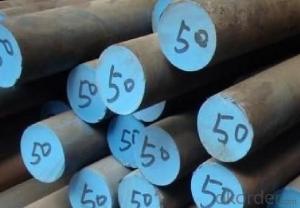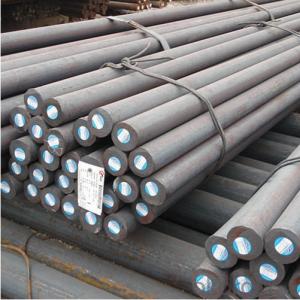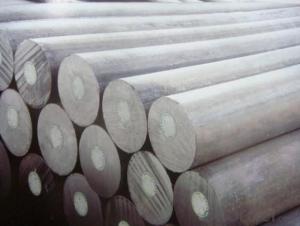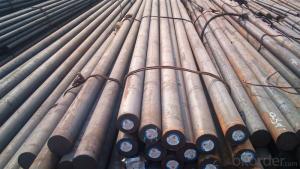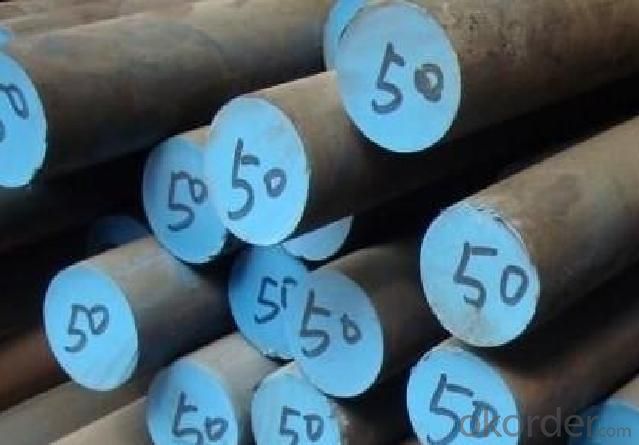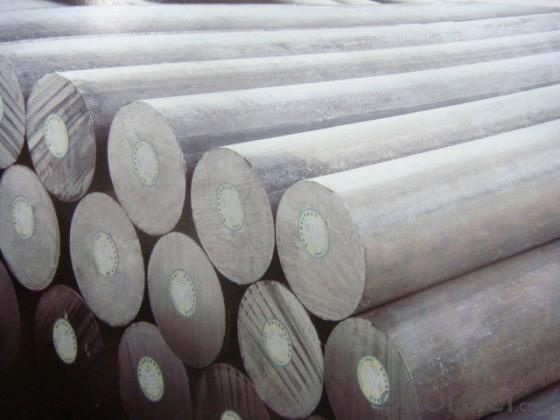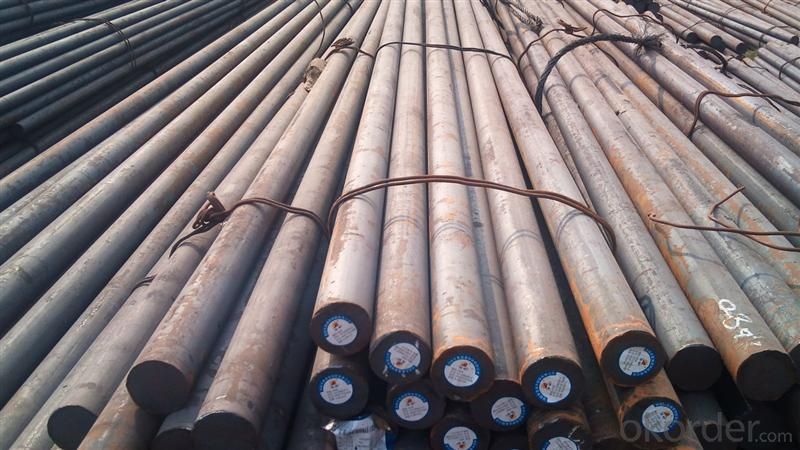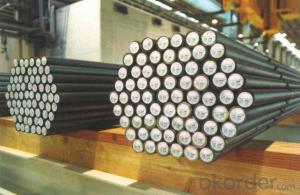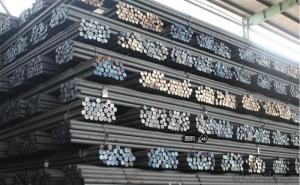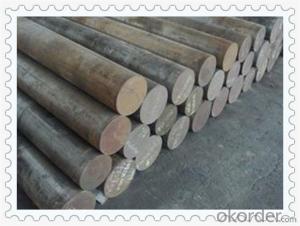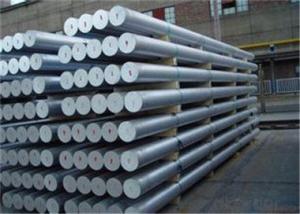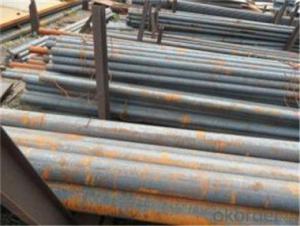SCM440 Alloy Steel Round Bars Hot Forged Bar
- Loading Port:
- Tianjin
- Payment Terms:
- TT OR LC
- Min Order Qty:
- 25 m.t.
- Supply Capability:
- 50000 m.t./month
OKorder Service Pledge
OKorder Financial Service
You Might Also Like
Specification
SCM440 Alloy Steel Round Bars Hot Forged Bar
Product Description:
1. Sizes: Diameter: 16mm-300mm; Length: 6m, 9m, 12m
2. Grade: 42CrMo, 4140,42CrMov,SCM440
3. Invoicing on theoretical weight or actual weight as customer’s request
4. Shape: Round bar, solid bar of steel with circular section
5. Technique: Hot rolled, forged, cold rolled
Specification:
Material | SCM440 | Round bar | Dia(mm) | 16-600 |
Process | EAF + LF + VD + Forged + Heat Treatment (optional) | Length (mm) | Max 12000 | |
Heat treatment | Normalized / Annealed / Quenched / tempered | Flat bar | Thickness(mm) | 8-500 |
Delivery condition | Hot forged +Rough machined (black surface after Q/T)+ Turned (optional) | Width(mm) | 70-200 | |
Test | Ultrasonic test according to SEP 1921-84 D/d | Length (mm) | Max 12000 |
Chemical Composition:
C | Si | Mn | Cr | Ni | Cu |
0.38~0.45 | 0.17~0.37 | 0.50~0.80 | 0.9-1.2 | ≤0.030 | ≤0.030 |
Packing and Delivery:
Packing in bundle with steel strips and shipped by break bulk vessel or container (depend on target market and different ports)
Delivery Detail: Approx.45 days
Usage and Applications:
1. SCM440 Alloy Steel Round Bars Hot Forged Bar is used in a large number of architectural and engineering structures. Or it can be used in construction of plants for the production of steel house frames, high-voltage transmission towers, bridges, vehicles, boilers, containers, ships, etc.
2. And we can use this kind of product on the performance of the mechanical parts if the demand is not very high.
3. Some especial material steel round bar can be used for main shaft of steamer, hummer shank, with big section and supper force.
Product Show:
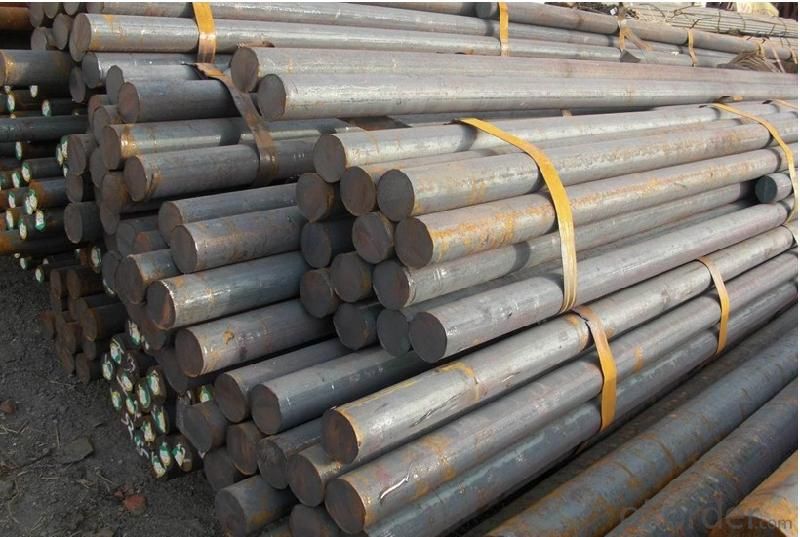
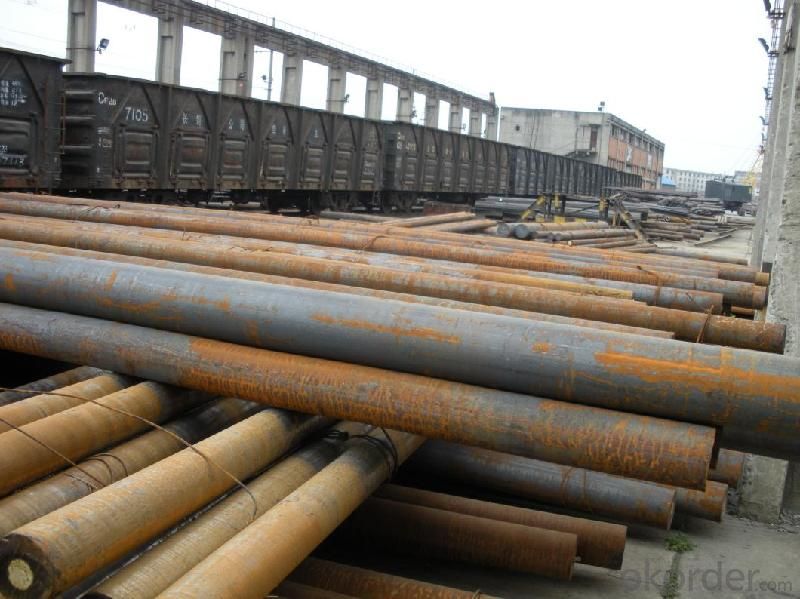
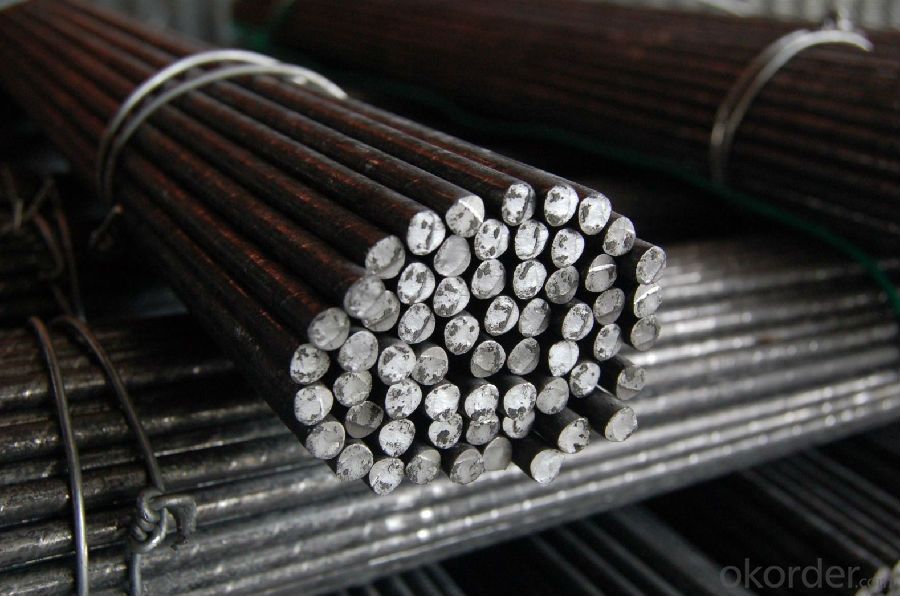
- Q: What are the main factors affecting the formability of special steel?
- The main factors affecting the formability of special steel include the composition of the steel, its microstructure, temperature, strain rate, and the presence of impurities or defects. These factors influence the ability of the steel to deform without cracking or fracturing during the forming process. Additionally, the mechanical properties, such as the yield strength and ductility, also play a significant role in determining the formability of special steel.
- Q: What are the common defects found in special steel production?
- Some common defects found in special steel production include surface cracks, internal voids or inclusions, segregation, decarburization, and improper grain size.
- Q: What are the challenges in manufacturing special steel?
- There are several challenges in manufacturing special steel. One of the main challenges is ensuring the precise composition and properties of the steel. Special steels often require specific alloying elements and precise heat treatments to achieve desired characteristics, making it crucial to maintain strict quality control throughout the manufacturing process. Another challenge is the high cost of raw materials and the need for advanced equipment and technology to produce special steel. Additionally, meeting stringent industry standards and regulations, as well as managing environmental impacts, can pose challenges in the manufacturing of special steel.
- Q: What are the properties of high-temperature tool steel?
- High-temperature tool steel possesses a combination of properties that make it suitable for use in high-temperature applications. It has excellent hardness, toughness, and wear resistance, enabling it to withstand extreme temperatures without losing its shape or strength. Additionally, it exhibits good thermal conductivity and dimensional stability, ensuring that it maintains its form and performance even under high heat and thermal cycling.
- Q: Can special steel be used in the production of springs?
- Yes, special steel can be used in the production of springs. Special steel, such as alloy steel, is often preferred for manufacturing springs due to its high strength, durability, and resistance to deformation. It allows for the production of springs that can withstand heavy loads, maintain their shape over time, and provide reliable performance in various applications.
- Q: What are the factors that affect the wear resistance of special steel?
- There are several factors that affect the wear resistance of special steel, including the composition of the steel itself, the hardness of the steel, the presence of any alloying elements, the microstructure of the steel, and the heat treatment process used. Other factors such as the type and intensity of the wear, environmental conditions, and lubrication also play a role in determining the wear resistance of special steel.
- Q: What's the difference between special steel and ordinary steel?
- Special steel is a kind of steel with special chemical composition (alloying), produced by special process, special organization and performance, and can meet special requirement.
- Q: What are the common grades of special steel?
- The common grades of special steel vary depending on the specific application and desired properties. Some of the commonly used grades include: 1. Stainless steel: This is a corrosion-resistant steel alloy that contains a minimum of 10.5% chromium. Grades such as 304, 316, and 410 are commonly used in various industries due to their excellent corrosion resistance, high strength, and good formability. 2. Tool steel: These grades are specifically designed for toolmaking and are known for their high hardness, wear resistance, and toughness. Common tool steel grades include D2, A2, O1, and S7, each having specific properties suitable for different applications. 3. High-speed steel (HSS): HSS is a type of tool steel that can retain its hardness and cutting ability even at high temperatures. It is commonly used in cutting tools such as drills, end mills, and taps. M2, M35, and M42 are some of the common grades of HSS. 4. Alloy steel: As the name suggests, alloy steel is made by adding different alloying elements to enhance specific properties. Grades such as 4140, 4340, and 8620 are commonly used due to their high strength, toughness, and wear resistance. They find applications in industries like automotive, aerospace, and machinery. 5. Spring steel: Spring steel is known for its ability to return to its original shape after being bent or twisted. Grades like 1095 and 5160 are commonly used in the manufacturing of springs, suspension components, and hand tools. These are just a few examples of the common grades of special steel. There are numerous other grades available, each with unique properties and applications. It is important to select the appropriate grade based on the specific requirements of the intended use.
- Q: What are the properties and characteristics of special steel?
- Special steel encompasses a type of steel that possesses distinct attributes and qualities, rendering it suitable for particular applications that demand exceptional strength, endurance, and resilience against diverse environmental factors. The properties and characteristics of special steel encompass the following: 1. Remarkable Strength: Special steel is renowned for its extraordinary strength, enabling it to endure heavy loads and extreme circumstances. This renders it ideal for applications requiring structural integrity and durability, such as the construction, automotive, and aerospace sectors. 2. Superb Resistance to Corrosion: Special steel is frequently alloyed with elements such as chromium and nickel, augmenting its resistance to corrosion and oxidation. This characteristic makes it immensely valuable in environments where exposure to moisture, chemicals, or extreme temperatures can rapidly deteriorate conventional steel. 3. Resistance to High Temperatures: Special steel is designed to maintain its mechanical properties and structural integrity even when subjected to elevated temperatures. It demonstrates exceptional thermal stability, making it suitable for applications involving intense heat, such as power generation, the oil and gas industry, and manufacturing processes. 4. Resistance to Wear: Special steel is frequently hardened and treated to enhance its resistance to wear. This trait enables it to withstand abrasive materials, friction, and erosion, making it suitable for cutting tools, machine parts, and wear-resistant components in heavy machinery. 5. Magnetic Characteristics: Certain types of special steel exhibit magnetic properties, rendering them ideal for applications in the electrical and electronics industries. Examples include electrical transformers, motors, generators, and magnetic shielding. 6. Machinability: Special steel is designed to be easily machined, enabling it to be shaped, formed, and fabricated into various components with precision. This attribute is crucial for industries requiring the production of intricate and complex parts in an efficient manner. 7. Cost-effectiveness: Despite possessing unique properties, special steel often proves to be cost-effective compared to other materials with similar performance characteristics. Its long lifespan, resistance to corrosion and wear, and versatility make it the preferred choice for numerous applications, offering a balance between performance and cost. In summary, special steel combines exceptional strength, resistance to corrosion and wear, heat resistance, and magnetic properties, making it a versatile material utilized in diverse industries. Its distinctive properties render it an indispensable component in applications where standard steel or alternative materials would not suffice.
- Q: How does special steel contribute to reducing production costs?
- Special steel can contribute to reducing production costs by offering improved durability and wear resistance, allowing for longer tool life and reducing the need for frequent replacements. Additionally, special steel's enhanced machinability can lead to faster production speeds and increased efficiency, resulting in cost savings.
Send your message to us
SCM440 Alloy Steel Round Bars Hot Forged Bar
- Loading Port:
- Tianjin
- Payment Terms:
- TT OR LC
- Min Order Qty:
- 25 m.t.
- Supply Capability:
- 50000 m.t./month
OKorder Service Pledge
OKorder Financial Service
Similar products
Hot products
Hot Searches
Related keywords
